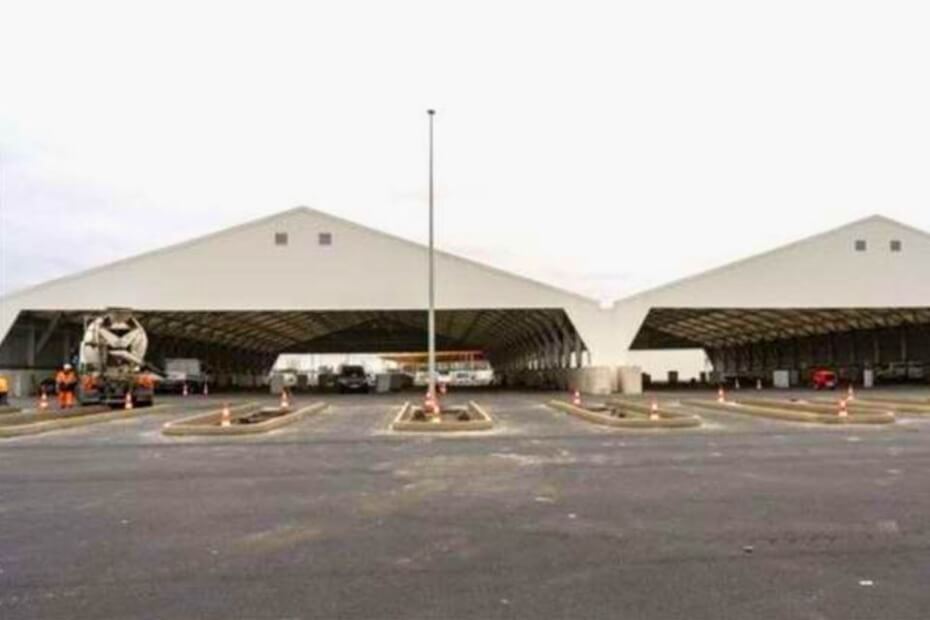
Getlink, the company that manages the Channel Tunnel, has completed the construction of a new Entry/Exit System (EES) infrastructure at its French terminal in Coquelles.
The infrastructure is a new roof-covered drive-through “pre-registration area” where passengers can submit passport and biometric data.
“At 7,000 square meters, it can accommodate up to 60 passenger vehicles simultaneously,” the firm said, as reported by The Local.
The drive-through facility will be used by non-European Union (EU) drivers using the LeShuttle service to travel to the United Kingdom (UK).
The EES is the EU’s new automated border check system that uses biometric data to record travelers’ entry and exit.
It will impact all non-EU travelers, including short-stay visa holders and visa-exempt nationals such as British citizens.
Instead of stamping passports at the border, the EES will record biometric data such as fingerprints and facial scans.
Each drive-through bay will have “two static kiosks necessary to complete the necessary biometric checks.”
The kiosks were supplied by French company IN Groupe and are specifically designed for car passengers.
Still, passengers would still have to get out of their cars to register their biometrics.
Getlink confirms that the first kiosks are now in place. The rest will be installed by early May 2024.
According to the French airline union L’Union des Aéroports Français (UAF), the European Council will launch EES in November 2024.
Getlink still has work to do to prepare for EES
Under EU laws, travelers must register facial and fingerprint data before a border officer the first time they enter the Schengen Zone.
On future visits, travelers can use fingerprints or facial biometrics to confirm their permission and record their entry and exit.
Travelers’ data will stay in the EES for three years or until their passport expires. It will refresh every time they enter the Schengen Zone.
Revisiting the EU after their data has expired will require them to register before a border officer again.
According to Getlink, they also built “a specific facility” with “a panoramic view of the pre-registration zone and parking bays.”
This, along with CCTVs, will help facilitate border checks conducted by the French border police or Police Aux Frontières (PAF).
Adapting the border crossing’s infrastructure at Folkestone on the UK side of the tunnel is ongoing until the summer. Kiosks will be installed on the UK side starting in July 2024.
In total, 224 kiosks will be installed on both the French and UK sides of the Channel Tunnel.
Getlink previously told the UK European Scrutiny Committee that it has invested €80 million to prepare its Coquelles and Folkestone terminals for the EES.
The European public company predicted that the EES would add five to seven minutes to passengers’ overall journey time.
As recorded by Connexion, Getlink is now confident in delivering the most competitive crossing time with new infrastructure and kiosks.
The company used artificial intelligence to conduct detailed traffic flow analyses under the new systems.
Several groups urge the EU to delay EES launch
Several other ports and larger airports are also installing kiosks and other equipment to speed up the EES data collection.
Nice Airport’s kiosks are reportedly ready. The port of Calais is also currently installing its equipment but expects to be ready on time.
On the other hand, Parisian airports would only be able to start construction work after the Olympics.
The 2024 Olympic and Paralympic Games are scheduled in France from 26 July to 11 August and 28 August to 8 September 2024, respectively.
This is despite the EU requiring the member states to set up the systems by the end of July.
For this reason, the UAF has been negotiating with the EU to delay the EES launch yet again.
Several other UK travel and transport officials had also expressed concerns about the potential long delays due to the EES.
Delays have been expected to be worse at the France-UK borders due to the sheer traffic volume and at borders with ‘juxtaposed controls.’
Juxtaposed controls mean French border checks are carried out on UK soil.
The Port of Dover, for instance, had warned the European Scrutiny Committee of 14-hour delays due to EES.
Eurostar may have to limit passenger numbers at London’s St Pancras train station to prevent delays and long queues.
The EU’s new EES app is currently under development and may help speed up border checks. However, some say it may not be ready in time for its launch later this year.
The UAF said it might also not be very helpful since it cannot take photos and travelers cannot upload fingerprints.
Using the EES app will also be voluntary for EU member states. France has yet to announce if it will use the app.

